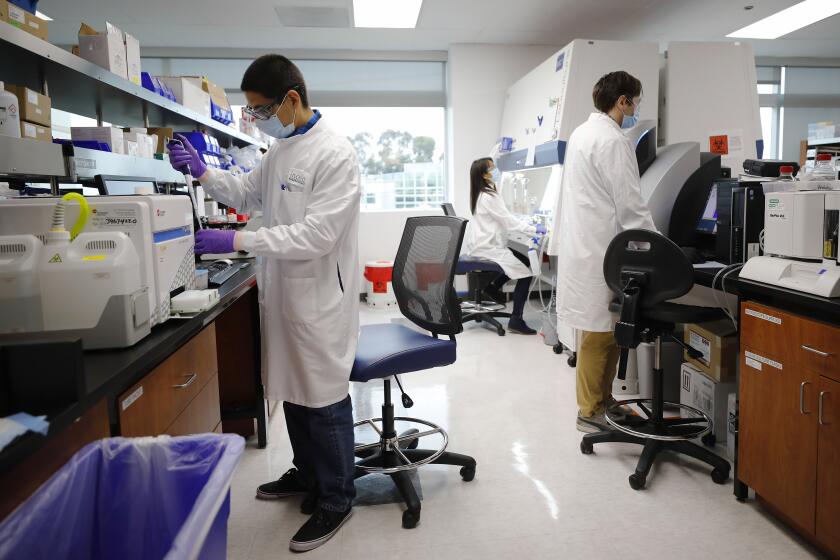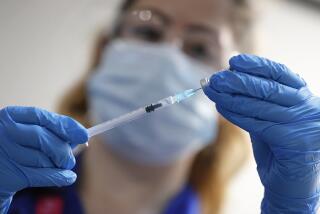Young San Diegans willing to be exposed to coronavirus to help with vaccine trials
The idea involves a controversial type of medical study known as a human challenge trial.
SAN DIEGO — She doesn’t think of herself as a risk-taker. But April Simpkins of San Diego says she’s willing to help test a COVID-19 vaccine by allowing herself to be directly exposed to the novel coronavirus, which has killed more than 130,000 people nationally since February.
“I’m young and healthy and don’t see that much danger,” said Simpkins, 29. “The coronavirus has really been surging lately and a trial like this could help develop a vaccine sooner.”
Simpkins is one of 30,000 people globally — and about 100 in San Diego — who have volunteered to participate in a controversial type of medical study known as a human challenge trial, or HCT, if such a trial gains federal approval.
The volunteers were recruited by 1 Day Sooner, a newly formed New York advocacy group that is promoting HCTs as a faster way of developing a vaccine. The group is looking mostly for younger people, whose COVID-19 mortality rate is lower than those who are older.
The idea is to directly expose a comparatively small number of volunteers to the coronavirus rather than following the traditional method of giving a vaccine to a large number of people who may or may not contract the virus over a long period of time.
1 Day Sooner says an HCT could greatly accelerate the evaluation of a vaccine, and produce data that would be useful in treating and preventing COVID-19.
Scientists are surging forward with possible COVID-19 vaccines, including here in San Diego. But they’ve still got a long way to go.
1 Day Sooner’s non-binding online registry could be useful to a pharmaceutical company or research university if they decide to seek approval for an HCT, which are rarely conducted by scientists because of safety and ethical issues. The group currently doesn’t have any formal agreements to help a university or pharmaceutical company to develop one of these trials.
“I tend to be cold-blooded when I weigh benefits against risks,” said Josh Morrison,the 35-year-old, Harvard-trained lawyer who co-founded 1 Day Sooner in April. “We might be able to save a lot of lives this way.”
HCTs have been used to test vaccines, notably against cholera and malaria. And the National Institutes of Health and the World Health Organization are examining whether such studies can play a role in the global quest to fight the coronavirus.
But there’s a lot of opposition and concern about HCTs in the scientific community, and some think a useful trial of that sort would take as long to design as developing a successful vaccine.
Many researchers blanch at the idea of intentionally exposing a healthy patient to the novel coronavirus, especially since there is no federally approved treatment for COVID-19. The FDA has so far given emergency use status only to the experimental anti-viral drug remdesivir.
“Because of the mortality and perhaps long-term problems with breathing after COVID-19, risk of infecting a normal individual with the virus is almost greater than the benefit to the research participant,” said Dr. Gary Firestein, director of the Clinical and Translational Research Institute at UC San Diego.
“In fact, there probably is no benefit to the participant. This could be mitigated by benefit to society, but I think that is offset by the extraordinary risk to the individual. It is hard to see an institutional review board approving a study that intentionally infects people with COVID-19.”
Dr. Davey Smith, director of infectious diseases and global public health at UC San Diego, said “there is no potential clinical benefit for participating in the study. The participant has nothing to gain except altruism ...
“I would feel better if there was a treatment for coronavirus if/when an infection occurred, like we have for malaria.”
Another UC San Diego scientist, postdoctoral research biologist Bryan Bishe, has a different perspective.
“Is this dangerous? Potentially,” said the 37-year-old Bishe, who signed 1 Day Sooner’s HCT registry.
“I am not naive about risk. But this is a calculated risk and we need a vaccine. With a challenge trial you can get a more immediate read out of whether the vaccine is effective at all.”
The need for a vaccine is clear.
The daily number of newly reported coronavirus infections in the U.S. has been regularly exceeding 50,000, and the federal government says the daily number could soon hit 100,000.
As that was happening, the National Institutes of Health was releasing a report that said the timeline for developing a robust HCT “that meets the essential criteria for limiting risk for study volunteers could take one to two years.”
“The authors conclude that large, randomized, controlled trials of SARS-CoV-2 are the fastest and most effective path forward for establishing vaccine safety and efficacy,” the report said.
Dr. Michael Kalichman, who has taught research ethics at UC San Diego for decades, said, “Researchers hold themselves to a high standard. You have to do that if you want people to trust you to participate in future studies.
“You do not want to have screwed up on something like this, and there have been a number of cases where things have gone wrong in human subject studies.”
He was referring, in part, to the infamous Tuskegee syphilis study, which the U.S. Public Health Service began in the 1930s to study venereal disease among African Americans at an Alabama educational institute now known as Tuskegee University.
It was later revealed that the government grossly misled participants about the nature of the study and that it failed to provide penicillin to infected men, about 100 of whom died of tertiary syphilis.
“There is reason to believe that members of the African American community are very dubious about what researchers might do to them if they participate in an organized study,” Kalichman said.
Other scientists note that putting together an HCT also would be expensive and challenging because they would have to screen the health of volunteers and make sure to include an adequate number of Black people, who are dying of COVID-19 at disproportionately high numbers. Volunteers also would have to be placed in a controlled environment for perhaps a month, in which they could be monitored and, if necessary, receive medical treatment.
Researchers believe such a trial could yield useful information. But the NIH has said that a vaccine that proved to be effective in the young might not broadly work in older people.
Kalichman said it also would be important to make sure that young people, who have less life experience, truly understand the risk they would be taking.
“That wouldn’t be a problem for me,” Simpkins said. “I have taken the virus seriously since the beginning. I quarantined, like other people.”
Patrick Mulrooney, a 36-year-old computer engineer at UC San Diego, also said he has given the matter thought and put things into perspective.
“I just don’t think the risk of death or injury from a trial like this would be that much greater than some of the things I already do, like riding my bike to work,” he said. “Even if you got into a trial where the vaccine turned out to be a dud, you’d learn things that could help.
“Even if a trial speeded things up by only a week, that would be important to me. I want life to get back to normal as fast as we can.”
Robbins writes for the San Diego Union-Tribune.
More to Read
Sign up for Essential California
The most important California stories and recommendations in your inbox every morning.
You may occasionally receive promotional content from the Los Angeles Times.












